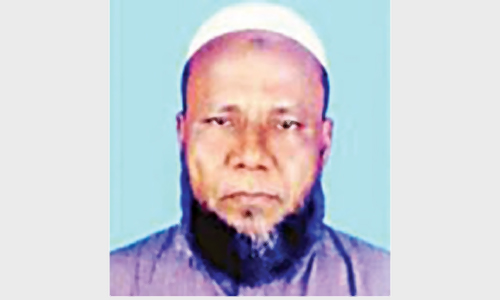Mobarak sentenced to death for war crimes
The International Crimes Tribunal-1 on Monday handed death sentence to Md Mobarak Hossain, an expelled local Awami League leader in Brahamanbaria, for 1971 mass killing.‘He be hanged by the neck till he is dead,’ said the unanimous verdict of the three-judge tribunal pronounced by presiding judge, Justice M Enayetur Rahim, at a full court hearing.It was the country’s 13th war crimes case verdict, delivered at around midday.The other judges are Justice Jahangir Hossain and Justice Anwarul Haque.On April 23, 2013, Mobarak was indicted on five counts of crimes against humanity and his trial ended on June 2.The tribunal found Mobarak, a potential member of armed Razakar force, guilty of two charges and exempted from three.
The tribunal sentenced Mobarak to death as he was found guilty of committing mass killings of 33 unarmed civilians on the bank of Gangasagar Dighi at the village Tanmandayl, Akhaura, Brahmanbaria on August 23, 1971 after they were abducted and tortured by him and his accomplices from the Razakar Bahini on August 22, 1971.He was sentenced to life term for the abduction and murder of Abdul Khaleque of the village Chhatiyan,Brahamanbaria police station on November 11, 1971.
‘However, as and when the “sentence of death” will be executed, the other sentence of “imprisonment for life” would naturally get merged into the sentence of death executed,’ the tribunal said.The tribunal acquitted him of the charges of grabbing Anandamoyee Kalibari and renaming it as Razakar Manzil, torturing Ashu Ranjan to death in late October 1971, abducting Khadem Hossain Khan on November 24, 1971 and later torturing him and abduction of Abdul Malek of Kharampur and Mohammad Siraj of Amirpara on November 28, 1971 and killing Siraj on the following day.In its observations, the tribunal said that the Pakistan Defence Ministry by an official order on September 7, 1971 had elevated the Razakar Bahini as an auxiliary force of Pakistan Armed Forces.
Before that the East Pakistan Razakar Ordinance, 1971was promulgated on August 2, 1971 by the then Government of East Pakistan, it said.
Quoting from a report ‘The Sunday Times’ of London published on June 20, 1971 under the headline ‘POGROM IN PAKISTAN/ Teachers, Writers, Journalists eliminated/ Magistrates shot, Doctors disappear/ Gestapo-like raids, rape, extortion,’ the tribunal said that before the promulgation of the Ordinance, Razakar bahini was formed and the members of the Bahini conducted atrocities all over the country to implement the common plan and policies of Pakistani occupation army, as its auxiliary force.The police produced Mobarak before the court at 11.10 AM.In white pajama and Panjabi, Mobarak looked pensive as he listened to the verdict seated on a chair in the dock.Mobarak was born at Nayadil, Akhaura, Brahamanbaria on January 10, 1950.In 1971, he was a member of Jamaat, which opposed the emergence of independent Bangladesh.He joined Awami League in the 1990s and served as the organising secretary of Mugra union AL, Akhaura, Brahmanbaria, for 16 years until expulsion in 2012.On May 3, 2009, Khodeza Begum, daughter of Khaleque, Mobarak’s victim, lodged a case with Brahamanbaria police station for killing her father in 1971 and the case was later forwarded to the ICT for investigation.On February 25, 2013, the prosecution submitted formal war crimes charges against Mobarak.After he surrendered before the High Court he was granted interim bail.His bail was extended several times by the ICT-1.On March 12, 2013, the tribunal took cognizance of the war crimes charges pressed against him and cancelled his bail.
The ICT-1, founded on March 25, 2010, has until now delivered verdicts in six war crimes cases.The ICT-2, founded on March 22, 2012, has so far delivered verdicts in seven war crimes cases.Besides prosecutors and the defence counsels, reporters assigned to cover the trial and freedom fighters were present in the court room.
In his reaction to reporters while leaving the court room with colleagues, prosecutor Shahidur Rahman expressed satisfaction over the verdict.Mobarak’s lawyer, M Tajul Islam, said that due to dependence on some of the prosecution witnesses’ ‘falsehood’ the court could not reach the right decision.He said that in none of the books published in Bangladesh in last 43 years his client’s name appeared as an anti-liberation element.‘The sentence would not stand in the Appellate Division of the Supreme Court,’ he said.Mobarak’s eldest son Asad Uddin claimed that his father was denied justice.‘We will appeal against the sentence,’ he said.
During the trial, 12 prosecution witnesses gave evidence against Mobarak.Mobarak himself and his eldest son Asad Uddin testified as defence witnesses.
Until now, 23 suspects were indicted for 1971 war crimes charges in 20 cases.The two tribunals convicted 14 of them in 13 cases. 12 of them leaders of Jamaat and Islami Chhatra Sangha as its student wing was called in 1971.One convict, a local Convention Muslim League leader, died while serving life in prison and one, the son of a Convention Muslim League leader, is in the death row.Verdicts against two accused in as many war crimes cases are pending.One accused died during trial.The trial of six accused in four cases are in progress.Eleven war crimes offenders were sentenced to death while three others received various jail terms.
The two ICTs were created to bring the suspects of 1971 war crimes to justice.
- See more at: http://newagebd.net/70169/mobarak-sentenced-to-death-for-war-crimes/#sthash.HbPcDBcM.dpuf











